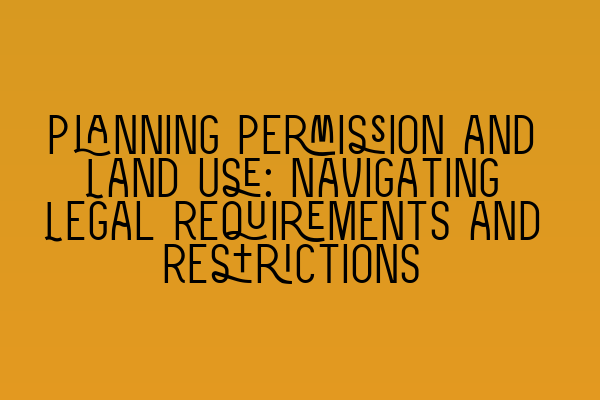Planning Permission and Land Use: Navigating Legal Requirements and Restrictions
When it comes to property development and land use, understanding the intricacies of planning permission and legal requirements is essential. Whether you’re looking to build a new property, make changes to an existing structure, or alter the use of land, obtaining the appropriate planning permission is crucial. Failure to comply with the legal regulations can result in delays, fines, or even the complete halt of your project.
In this blog post, we will guide you through the process of obtaining planning permission and understanding the legal restrictions and requirements associated with land use. We will cover key concepts, regulations, and important considerations to help you navigate through the complexities of property law successfully.
1. Introduction to Planning Permission:
Planning permission is a legal requirement for most types of development in the UK. It is a process that ensures that proposed developments align with local and national planning policies, safeguarding the well-being of the community and protecting the natural environment. Having a clear understanding of the planning permission process is vital for anyone considering property development.
2. The Planning Application Process:
To obtain planning permission, an application must be submitted to the local planning authority (LPA) responsible for the area in which the development is proposed. During the application process, factors such as the impact on the local environment, transport, and infrastructure, as well as the concerns of the public, will be assessed. Proper preparation and submission of a comprehensive planning application are crucial for a favorable outcome.
3. Types of Planning Permission:
There are different types of planning permission depending on the nature of the proposed development. These include outline planning permission, full planning permission, and listed building consent, among others. Each type of permission has its own set of requirements and restrictions, and understanding these distinctions is essential for a successful application.
4. Legal Restrictions and Considerations:
Numerous legal restrictions and considerations can impact the granting of planning permission and the use of land. These may include zoning laws, conservation areas, listed buildings, protected habitats, and more. Familiarizing yourself with these regulations and restrictions is crucial to ensure compliance and avoid potential legal issues.
5. Dealing with Objections and Appeal Process:
During the planning permission process, objections from local residents and interested parties may arise. Understanding how to address objections effectively and navigate the appeals process is essential in securing a positive outcome for your development. Consulting with an experienced property law solicitor can provide you with invaluable guidance and support in dealing with objections and appeals.
6. The Role of Environmental Impact Assessments:
For certain development projects, an Environmental Impact Assessment (EIA) may be required. EIAs evaluate the potential environmental effects of a proposed development and provide recommendations to mitigate any adverse impacts. Understanding when an EIA is required and how to navigate this process is crucial to ensure compliance with environmental regulations.
7. Working with Professionals:
Navigating the complexities of planning permission and land use can be challenging, and seeking the advice of professionals is highly recommended. Engaging the services of a property law solicitor who specializes in planning permission can help you navigate the legal requirements, assess the viability of your proposed development, and ensure compliance with all regulations.
Conclusion:
Obtaining planning permission and understanding the legal requirements and restrictions associated with land use is a crucial aspect of any property development project. With thorough knowledge of the planning permission process, legal regulations, and the assistance of professionals, you can navigate through the complexities successfully. Remember to always consult with a qualified property law solicitor to ensure compliance and protect the interests of your development.
At SQE Property Law & Land Law, our team of experienced solicitors specializes in all aspects of property law, including planning permission and land use. If you require assistance with obtaining planning permission or have any questions about property development, feel free to contact us for expert advice.
Related Articles:
– SQE 1 Practice Exam Questions
– SQE 1 Practice Mocks FLK1 FLK2
– SQE 2 Preparation Courses
– SQE 1 Preparation Courses
– SRA SQE Exam Dates
